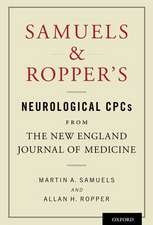Enzyme Kinetics: Catalysis and Control: A Reference of Theory and Best-Practice Methods
Autor Daniel L. Purichen Limba Engleză Hardback – 15 iun 2010
- Historical analysis of kinetic principles including advanced enzyme science
- Provides both theoretical and practical measurements tools
- Coverage of single molecular kinetics
- Examination of force generation mechanisms
- Discussion of organic and inorganic enzyme reactions
Preț: 1064.34 lei
Preț vechi: 1383.91 lei
-23% Nou
Puncte Express: 1597
Preț estimativ în valută:
203.68€ • 221.17$ • 171.10£
203.68€ • 221.17$ • 171.10£
Carte tipărită la comandă
Livrare economică 15-29 aprilie
Preluare comenzi: 021 569.72.76
Specificații
ISBN-13: 9780123809247
ISBN-10: 012380924X
Pagini: 920
Ilustrații: 500 illustrations (500 in full color)
Dimensiuni: 216 x 276 x 51 mm
Greutate: 3.18 kg
Editura: ELSEVIER SCIENCE
ISBN-10: 012380924X
Pagini: 920
Ilustrații: 500 illustrations (500 in full color)
Dimensiuni: 216 x 276 x 51 mm
Greutate: 3.18 kg
Editura: ELSEVIER SCIENCE
Public țintă
Professionals and graduate students researching enzymes in biochemistry and molecular biology, biotechnology, bioengineering, plant sciences, chemical engineering, and pharmacology fields.Cuprins
- An Introduction to Enzyme Rate Processes
- Active Sites & Their Chemical Properties
- Fundamentals of Chemical Kinetics
- Practical Aspects of Measuring Rates & Kinetic
- Initial-Rate Kinetics of One-Substrate Enzyme-Catalyzed Reactions
- Initial-Rate Kinetics of Multi-Substrate Enzyme-Catalyzed Reactions
- Other Factors Influencing Enzyme Activity
- Kinetic Behavior of Enzyme Inhibitors
- Isotopic Probes of Biological Catalysis
- Probing Fast Enzyme Processes
- Regulatory Behavior of Enzymes
- Single-Molecule Enzyme Kinetics
- Force Generation in Mechanoenzyme Catalysis
- On Keeping a Research Notebook
- Steady-State Rate Equations for Selected One- & Two-Substrate Enzyme-Catalyzed Reactions
- Summary of Enzyme Kinetic Mechanisms Abbreviations & Symbols References
Recenzii
"…this is an excellent book. It is difficult to pick it up without finding something new, interesting, and useful. The breadth of coverage and the author’s familiarity with disparate topics are impressive, and the references both to published work and to webbased resources are up to date so that one can jump into the primary literature as necessary." --Catal Lett, 2012, Volume 142
"One of the great strengths of this book is that the voice of the author comes through on every page. He does not simply list different methods for rate equation derivation, for example, but comments on the situations to which each is best suited. Chapter One includes a scolding of the Nobel Prize committee for overlooking Britton Chance’s contributions to science. Critical evaluations of published experimental data and alternative explanations are presented. Articulate arguments for the importance of continued research in enzymology are offered, and there is a thoughtful discussion of how pharmacologically useful compounds are developed. Above all, the people who have conducted the research upon which the book is based are recognized. The list of researchers who ‘‘made advances so notable that they personify the field’’ provides plenty of fodder for late night discussions at the Enzymes Gordon Conference. Whether one agrees with all of Purich’s judgements or not, their inclusion makes reading his book very enjoyable, and also documents his deep familiarity with and affection for the field…this is an excellent book. It is difficult to pick it up without finding something new, interesting, and useful. The breadth of coverage and the author’s familiarity with disparate topics are impressive, and the references both to published work and to web- based resources are up to date so that one can jump into the primary literature as necessary." --Springer, Science and Business Media, LLC
"One of the great strengths of this book is that the voice of the author comes through on every page. He does not simply list different methods for rate equation derivation, for example, but comments on the situations to which each is best suited. Chapter One includes a scolding of the Nobel Prize committee for overlooking Britton Chance’s contributions to science. Critical evaluations of published experimental data and alternative explanations are presented. Articulate arguments for the importance of continued research in enzymology are offered, and there is a thoughtful discussion of how pharmacologically useful compounds are developed. Above all, the people who have conducted the research upon which the book is based are recognized. The list of researchers who ‘‘made advances so notable that they personify the field’’ provides plenty of fodder for late night discussions at the Enzymes Gordon Conference. Whether one agrees with all of Purich’s judgements or not, their inclusion makes reading his book very enjoyable, and also documents his deep familiarity with and affection for the field…this is an excellent book. It is difficult to pick it up without finding something new, interesting, and useful. The breadth of coverage and the author’s familiarity with disparate topics are impressive, and the references both to published work and to web- based resources are up to date so that one can jump into the primary literature as necessary." --Springer, Science and Business Media, LLC



